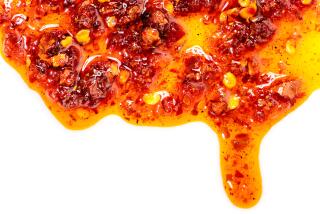It’s What’s on the Outside That Counts
- Share via
BREMEN, Maine — Experimenting with formulations of a white hot sauce that would be new and different, Stewart Blackburn was pleased with what he concocted: a fiery explosion of hot peppers in a horseradish and daikon base.
Now came the critical part--selecting a name and designing a package.
He considered, briefly, Polar Pepper Sauce, featuring an illustration of the make-believe polar pepper that grows in the snow. Then came Powderkeg, sporting a snappy picture of a white horse perched atop a barrel with a lit fuse.
That had just the oomph Blackburn was looking for.
“You have to be funny, funky, a little bit wild and crazy. It’s macho. It’s a caricature of macho, really,” said Blackburn, founder of ‘Stache Foods Inc., which draws its name from his distinctive handlebar mustache.
In the crowded specialty foods business, the sizzle often seems more crucial than the steak. By Blackburn’s calculations, a rough measure of a new product’s success is 40% labeling and 40% marketing. The remaining 20% is “what’s in the bottle.”
‘Stache Foods has about 40 products in its line, including four hot sauces: the cranberry-based Sourpuss; blueberry-based Wild Blue Yonder; VooDoo Jerk Slather, a Caribbean-style sauce that remains his No. 1 seller; and Powderkeg, introduced this year.
*
Other sauces include Blackburn’s maple barbecue, the first item he packaged when he began the business 12 years ago. He has since added cocktail sauce, satay sauce, cashew ginger sauce, pizza sauce and pasta sauce.
Among his other products are four varieties of spud spices to perk up potatoes; six flavors of Uncle Billy’s Death by Chocolate, a chocolate sauce made with chestnut puree, Amaretto and rum; a dozen varieties of Maine Mountain Mornings pancake and muffin mixes; and three salsas under the label El Bigotudo--the man with the big mustache.
In a business marked by fickle tastes and fierce competition, Blackburn knows he must constantly refresh his product line.
“This is very much an entertainment business,” he said. “People are looking for what’s new, what piques their interest. Consequently, you need to have new stuff each year.”
Selling primarily in gourmet food markets and gift shops, Blackburn targets his output for niche markets.
“We can’t fit into the grocery store model, which requires high volume and low price,” he said. As with other specialty foods, ‘Stache aims for lower-volume, labor-intensive products that can command higher margins.
Blackburn, who turns 50 next April Fool’s Day, traces his entry to the food business to 1974, the year he graduated from Bowdoin College with a degree in biology and physics and received a Watson Fellowship to study wild mushrooms.
“I spent a year traipsing around New Zealand, picking mushrooms,” he recalled. “In doing that, I obviously had to cook them.”
Discovering his love of cooking, Blackburn went to study at the San Francisco Culinary Academy. He later worked as a chef in the Virgin Islands, Alaska and Martha’s Vineyard in Massachusetts, developing a specialty in grilling and outdoor cookery along the way.
He returned to Maine in 1985 and founded ‘Stache Foods to supplement his catering business. The company grew quickly in its early years, he said, but then leveled off “at just under a living, survivable wage.”
“I got very frustrated,” said Blackburn, who thought of closing the business but opted instead to bring in a partner, Tony Kilburn, as sales manager. Thanks to Kilburn’s expertise, sales rose 70% last year and are up 50% so far this year, Blackburn said.
*
‘Stache Foods, with seven employees and projected sales of $700,000 in 1997, is poised for continued growth, and Blackburn is looking to break into European and Asian markets. But the business is still small enough to allow him to sample each batch to make sure the blend of ingredients passes muster before it’s packed.
The aromas in the kitchen of the former restaurant that houses the company loudly proclaim what’s on the production line. The intoxicating richness of chocolate sauce that fills the air one day can be supplanted the next by the pungency of Powderkeg that leaves tears streaming down the faces of the packers.
“I’ve got a pretty good idea what it is I’m trying to create,” Blackburn said. “I can think in flavors the way a musician thinks in sounds.”
More to Read
Eat your way across L.A.
Get our weekly Tasting Notes newsletter for reviews, news and more.
You may occasionally receive promotional content from the Los Angeles Times.










